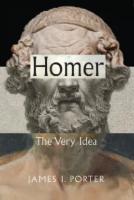
Chicago (2021) h/b 277pp £22 (ISBN 9780226675893)
Another book about Homer? No, says P., this one is quite different: he will tease out the sources of Homer’s mystique down the ages, examining the fascination he has cast over posterity since the first recorded references in ancient Greece. There will be nothing about Homer the poet or his supposed historical existence, about the poems’ literary worth or the circumstances of their composition, certainly nothing about heroic society, simply the pursuit of a concept, an idea, a cultural invention of successive ages called ‘Homer’.
Five chapters set out P.’s thesis, entitled Why Homer (i.e. why the Iliad and Odyssey are worth studying); Who Was Homer? Apotheosis or Apostasy (i.e. which commentators and critics rate the poems and which don’t); What Did Homer See (i.e. did he witness the action he describes?); Why War? (P. is mainly interested in the Iliad).
It soon becomes clear that despite his determination to eschew discussion of anything except a fleeting image of Homer as a cultural ‘deictic marker’, P. seems to be arguing against his professed aims. The background takes over, as familiar Homeric comment is referenced and deployed at length in order to support a thesis that rarely makes itself clear or comprehensible—even in the face of P.’s claim that it is ‘as distinctive and important as the poems themselves’.
What we are actually offered here is ideas—in some cases bold ideas—that could have been written up into shorter articles. In particular: a study of what P. terms modern disenchanted readings of Homer, quoting with approval the strongly critical attitudes of Adorno and Simone Weil; a rapid sweep through the whole range of Homeric reception; and war.
This last appears to be what P. really wants to write about. He clearly finds the Iliad’s emphasis on fighting distasteful. He attacks the idea that winning kleos aphthiton, imperishable glory, on the heroic battlefield can in any way be ennobling. The only way to understand Homer’s treatment of war, he feels, is not to work out patiently what might have animated Achilles and Hector but to consult one’s contemporary cultural stance. Subtler intellects like Vernant and Griffin (the latter brazenly misquoted by P. in his conclusion) are brushed aside for their naivety, and modern German scholarship linked to Nazism. By the conclusion to Chapter 5 the ‘idea of Homer’ has completely disappeared. Was it ever there to start with?
Anthony Verity
